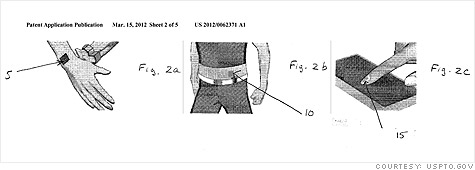Search News

The sketches in Nokia's patent application show how its proposed "haptic feedback" system could be attached to the user's skin.
NEW YORK (CNN) -- Nobody likes a loud ringtone, and if you don't have your phone close by, you might not feel it vibrate. Finnish-based Nokia has a potential solution, with just one catch: You need to get a tattoo.
In a recent filing to the U.S. Patent and Trademark Office, Nokia (NOK) described a concept for using magnetic ink embedded in the skin to interact with a specific electromagnetic field put off by mobile phones. The interaction would generate a perceivable stimulus when the ink registers "an alert of an incoming message, a phone call, an alarm."
In other words, your tattoo will vibrate with your phone.
Karen Lachtanski, a spokeswoman for Nokia, said she couldn't speak to when the technology might be commercially developed.
"We file more than 1,000 patents and inventions a year, but don't comment on when or how they'll be used in a Nokia product," she said.
The patent, first spotted by tech website unwiredview.com, implies that tele-tattoos could look just like any other tattoo, using ferromagnetic powder made into a specialty ink. And just as with ringtones, the tattoo wearer could personalize the vibrations, setting different sensations for various people or to differentiate between text messages, e-mails and calendar alerts.
If you're not interested in embedding phone links in your skin, Nokia has a less drastic suggestion. Its patent application also covers "magnetic materials" attachable to the skin, like a label or a badge. The sketches Nokia included show what look like stickers pasted to the wearer's wrist or abdomen.
That sounds like an easier sell -- but one without the "wow" factor and lifetime staying power of a tattoo. ![]()